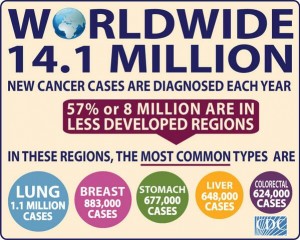 Cancer is one of the most horrific, terrifying, and destructive diseases, stealing the lives of nearly 600K Americans a year. It is the number 2 cause of death and it impacts all of us, as we either know someone who has suffered from it or have done so personally. I have witnessed many loved ones fight for their life and many who have lost the battle over the years and it is a powerful, poorly understood nemesis. Unfortunately, scientists and physicians do not fully have a grasp on prevention or treatment of the multitude of cancers, as there are many different types, with different personalities, and varying responses to treatment modalities, despite the vast resources, time, and money focused on advancing the technology. What we know about diet and lifestyle’s effect on cancer is also minimal, but there are some associations that are pretty well-established. I say we do all that is in our power to incorporate those recommendations to prevent cancer to the best of our ability and do our best with what we do know.
Cancer is one of the most horrific, terrifying, and destructive diseases, stealing the lives of nearly 600K Americans a year. It is the number 2 cause of death and it impacts all of us, as we either know someone who has suffered from it or have done so personally. I have witnessed many loved ones fight for their life and many who have lost the battle over the years and it is a powerful, poorly understood nemesis. Unfortunately, scientists and physicians do not fully have a grasp on prevention or treatment of the multitude of cancers, as there are many different types, with different personalities, and varying responses to treatment modalities, despite the vast resources, time, and money focused on advancing the technology. What we know about diet and lifestyle’s effect on cancer is also minimal, but there are some associations that are pretty well-established. I say we do all that is in our power to incorporate those recommendations to prevent cancer to the best of our ability and do our best with what we do know.
- Obesity is the second largest risk factor for cancer, coming in after smoking.
- Consuming plenty of fruits and vegetables consistently helps reduce risk for cancer.
- Soy products may reduce risk for certain cancers.
- Certain animal products, including red and processed meats, meats cooked at high temperatures, and dairy products promote cancer growth.
- Alcohol increases risk for cancer.
- Environmental toxins increase risk for cancer, especially in concentrated doses.
Here is what we can do about it to minimize risk:
- Maintain a healthy body weight by eating a nutrient-dense, calorie-poor diet and exercising regularly.
- Make at least half of your plate/diet/day be filled with colorful fruits and vegetables. Eat a minimum of 7 servings of fruits and vegetables a day.
- Eat a whole food, plant-based diet to get a continuous flow of cancer-fighting phytochemicals and fiber running through your GI tract and promoting immune health.
 Avoid meats, fish, dairy, and eggs to decrease toxin load.
Avoid meats, fish, dairy, and eggs to decrease toxin load.- Limit alcohol intake to no more than one serving a day for women and 2 servings a day for men.
- Clean up your environment as best as possible by reducing use of chemicals in your home, in your laundry, on your body, and with the tools, equipment, and cookware you use to cook and prepare food in.
- Practice stress reduction and mindfulness.
- Quit smoking.
Resources:
- New Dietary Guidelines for Cancer Prevention
- Obesity, Cancer, and a Vegan Diet
- Food, Nutrition, Physical Activity, and the Prevention of Cancer
- American Cancer Society Guidelines on Nutrition and Physical Activity for Cancer Prevention
- AICR on Soy and Cancer
- Detoxing Your Home on Reluctantly Healthy
- Eating Whole Food, Plant-Based
- Move More
- Adding Mindfulness to Your Day
[/fusion_builder_column][/fusion_builder_row][/fusion_builder_container]

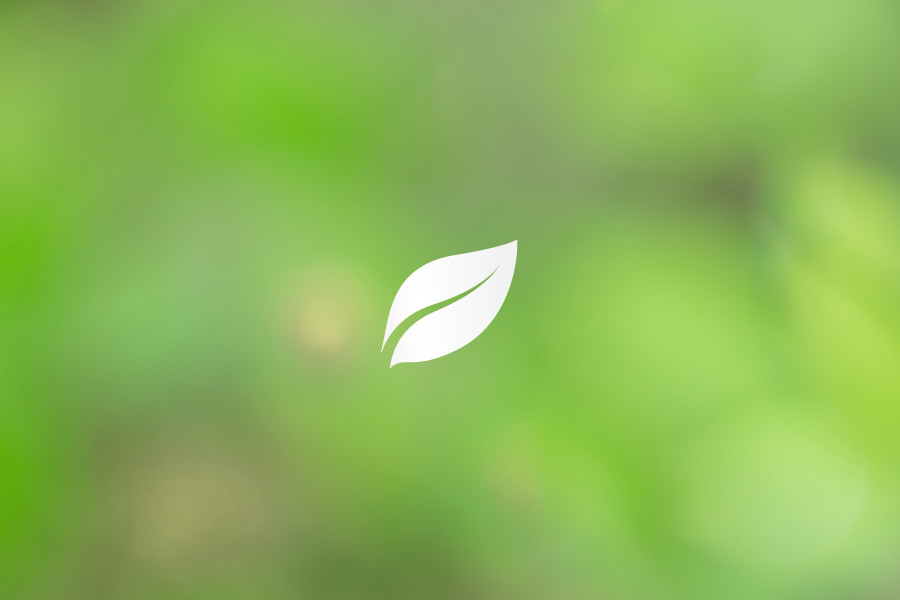
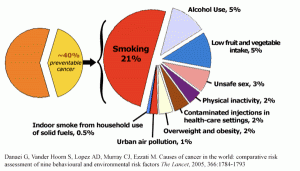
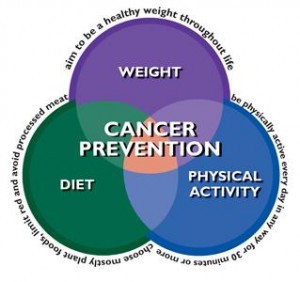
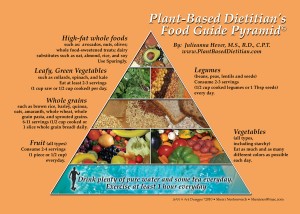


This Post Has 3 Comments
I was told recently that olive oil is good for cancer prevention. I have been avoiding oils. Do you have an opinion on this?
The question is always, “compared to what?” Compared to lard, olive oil is likely better for reducing chronic disease risk. But compared to kale, it probably doesn’t stack up. To reduce your risk of cancer, the most important things to do include decreasing consumption of animal products and highly refined foods, increasing vegetable and fruit intake, maintaining a healthy weight, and avoiding smoking. Unfortunately, there is no magic food that can help prevent cancer on its own. And, like you are already doing, I recommend reducing consumption of oils, as they are not essential, they are processed foods, and they may contribute to weight gain.
Thank you for your response. I appreciate it very much. I am vegan and eat a mostly oil free WFPB diet. I eat very clean. This doctor suggested that I intentionally add 2 tablespoons of olive oil per day (as a treatment rather than replacement) due to specific cancer fighting properties. Based on my research it contains oleocanthal. I see that there are some peer reviewed journal articles saying oleocanthal can help kill cancer cells. I don’t think it is found in any other foods. I think that was why this naturopathic oncologist thought I should be consuming it since I had cancer (he also suggested several other things in addition). I just felt very conflicted by this information as I know all the prominent plant based doctors advise no oil. Thank you for the additional insight.